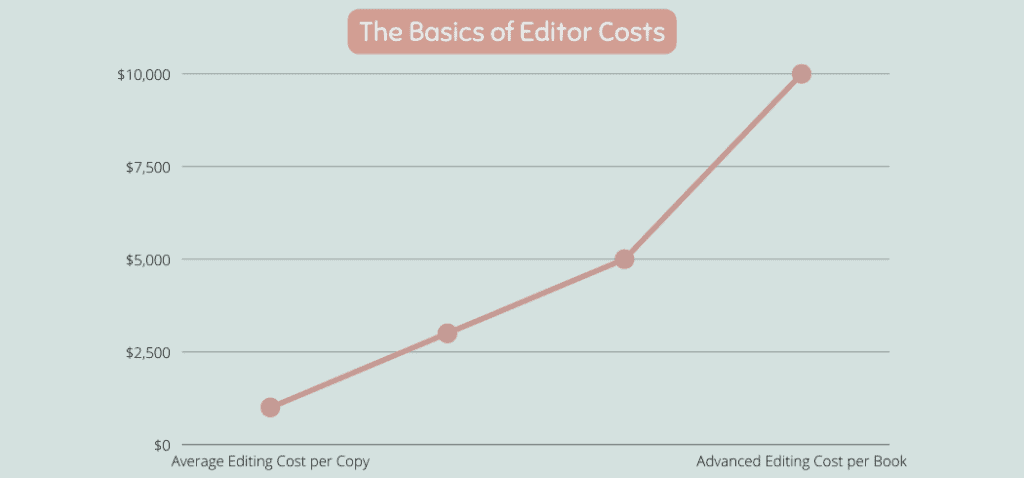Are you looking to publish your first manuscript or an important paper, and you’re unsure if you can afford an editor? In my years of experience in publishing, an editor is worth their weight in gold, and we should all find ways to afford one. Learn how much editors charge per word and what to look for when hiring one.
The Basics of Editor Costs

Just like the price of any other self-publishing service, the price of hiring an editor is contingent on a variety of different criteria. The rate for editing also depends on their level of experience.
The average ballpark estimate for editing a book’s copy and proofreading is anywhere from $1,000 to $3,000. The cost of developmental editing, often known as the more advanced work, can range from $5,000 to $10,000 per book.
Some editors charge an hourly rate, while others work on a per-word or per-page basis. Find what works for you and pair yourself with an editor whose structure works for you.
Is Paying for an Editor Worth It?
It depends on what your writing is for. Hiring a qualified editor is an excellent idea if you’re submitting a paper or any piece of writing for educational, research, or job-related purposes.
If you’re writing and publishing works of fiction like me, then yes, 100% worth it. A good editor will fix things like grammatical and spelling mistakes and improve the overall quality of writing.
But if you publish a lifestyle article on your blog, then it’s probably not worth the expense. Personally, I’d just opt for an editing program like Grammarly to help you out there.
Master the art of precision writing!
Embark on our proofreading and editing course.
How Much Does an Editor Cost Per Hour?
Editing prices for freelance work can range from $61 to $70 per hour for consulting to $30 to $45 per hour for proofreading and anything in between.
Although the EFA survey is often considered the most reliable indicator of industry standards, it is not the only approach to gaining an idea of how much editors charge for their services. A novice editor will charge less compared to experienced editors.
Can an Editor Steal Your Book?
In theory, an editor can steal your book, but it’s not worth it for them because they risk ruining their whole business. Therefore, it’s unlikely this will happen. Most editors working in the publishing sector have a bachelor’s degree or higher in their field. Earning this degree takes time and effort and needs significant financial investment. I’ve written and published over twenty books and dozens of short stories, and not once has an editor stolen my work.
If an editor were to steal a client’s work, the editor would likely lose their employment, and the degree they earned in journalism or communications could be rendered completely useless. This is because the publishing industry frowns upon plagiarism, and anyone with a reputation for engaging in the practice risks exclusion from the profession.
When Should I Hire an Editor?

Get an editor as soon as possible. I say this because, in my experience, finding and securing a good editor requires time. Most of them are booked in advance, and if you need them for the manuscript you’re working on, it’s best to schedule a spot asap. Editors are not intended to serve as a replacement for the time spent preparing, drafting, and laboring over a piece of writing.
Provide an editor with the cleanest manuscript you can generate. They will be able to concentrate on the work’s overarching themes rather than wasting time correcting errors that could have and should have previously been addressed.
Should I Get an Editor Before an Agent?
It depends on who you ask. But, as someone who’s been in the publishing industry for almost fifteen years, I can say one thing; the more polished your manuscript is, the higher the chance of landing an agent.
Being in the slush pile can be a trying experience due to the intense competition in the publishing industry. It is not simple to submit your work to agencies, and some of the components of a submission package, such as a query letter and a synopsis, can be challenging to get just right.
It may be beneficial to hire an editor to obtain some feedback on these topics that is more comprehensive, or recommendations, before presenting your work to agencies. Editors that have experience in the traditional publishing business, the process by which agents operate, and your particular genre are in an excellent position to direct you.
Do You Need an Editor?
Short answer? Yes. Long answer? It depends on what stage you’re at. If you just completed your manuscript or paper, don’t send it off to an editor just yet. Let it sit, then spend some time polishing it yourself first.
How Do I Hire an Editor?
You’ll have to check out many editors before choosing one right for you. I suggest asking around in author groups on Facebook for recommendations. Then check them out, one by one. Compile a list of names that seem to have what you’re looking for, then contact them per the method they list on their page or site.
Where Can I Hire an Editor?
There are platforms online where you can hire good editors. Most freelance editors have websites with their portfolios, rates, and services. Also, check out platforms such as Upwork and look for editors with many positive reviews. Some companies are offering entire teams of editors at the client’s disposal.
Questions to Ask Before Hiring an Editor

When I was on my journey to find the perfect editor, these were the things I asked them and myself before landing on an amazing editor with decades of experience.
What Kind of Editing Do You Need?
Different types of editing services come with different fees. Proofreading means checking for consistency, layout, and format. Developmental editing means looking at the macro, the big picture, and editing the content. Developmental editing is more expensive than proofreading.
Basic copyediting costs far less than substantive editing for plot and flow on an entire manuscript. Most professional editing services will have options you can choose from.
If you’re looking to save money, I suggest performing as many line edits as possible and saving your budget for a developmental editor.
What’s Your Total Word Count?
Book editors that work for hire often base their fees on the number of words edited or the number of pages edited. Some editors bill per hour, but this is unusual, particularly for those who edit lengthy volumes. I suggest avoiding the per-hour editors as it’s too easy for them to fudge the amount of time they’ve spent on it.
Knowing the entire number of words in your project is necessary for an editor to accurately estimate the costs associated with working on your project.
How Complex Is Your Book?
Editing a novel according to the Chicago Manual of Style will be more expensive than editing academic work according to a specialized style guide.
The cost to edit a book that has hundreds of footnotes or endnotes ought to be greater than the cost to edit a book that does not contain any citations.
In other words, the rate at which your book is edited will be affected by the difficulty of your work and the specific niche in which it falls.
What’s Your Deadline?
In what time frame do you require the task to be completed? The more flexible your delivery date, the lower your potential cost will be.
If you request that your novel of 100,000 words be copyedited within two weeks, you might be required to pay a premium for such a short turnaround, especially when looking to hire a busy editor.
For example, last year, I fell behind on my publishing schedule and rushed to finish a 100,000-word fantasy novel. My editor had an opening, but I needed it sooner, so she made it work and charged me an extra fee.
What’s Your Writing Experience?
Which of these three descriptions best describes your writing ability: novice, intermediate, or advanced?
By definition, starting writers will want further assistance, which will take more time and will likely cost them more money.
An expert editor can frequently tell just by looking at a portion of the manuscripts how experienced the author is, how long it will take them to edit the entire document, and how long they will need to spend on the editing process.
I always recommend polishing the manuscript as much as you can yourself first. Then utilize programs such as Grammarly, ProWritingAid, Google Edits, etc., before sending to an editor.
What’s Your Editor’s Experience Level And/Or Demand?
An inexperienced editor will charge less for their services than an editor with decades of expertise and a portfolio that includes many best-sellers. You get what you pay for, and a seasoned editor may add more worth to your work.
What’s Your Flexibility?
Determine whether or not you’re willing to wait to book a certain editor or if you just one the first one that’s available.
Or, if they have such an option, are you willing to pay a premium to go ahead in their line? Or, in the interest of getting your editing done more expediently, are you going to choose a less well-known or less experienced editor who charges a reduced rate?
Manuscript Proofreading Rates
It is reasonable to anticipate paying between $25 and $35 per thousand words for the services of a professional editor who proofreads. The cost of proofreading can range from $1,250 to $1,750 for a 50,000-word document, which is equivalent to around 200 pages of a book, depending on the skill level of the proofreader.
Manuscript Copy Editing Rates
Regarding completeness, copyediting is one step above line editing, and the rate for copy editing your work is often between $.02 and $.04 per word. Some copy editors assess fees based on the number of pages of the manuscript, with prices ranging from $2.50 to $5 per page.
Manuscript Line Editing Rates
Rates for line editing a manuscript typically cost between $.04 and $.09 per word. Some copy editors charge by the page of the manuscript, with prices ranging from $5 to $15 per page.
Final Thoughts
A book editor might be the right call if you’re looking to get your book published. Of course, paying an editor isn’t always a justified expense, so I would strongly recommend you brush up on your self-editing skills and use the power of editing tools and beta readers. You can find editors at acceptable fees but be sure to check their credentials before handing your work over and paying hundreds or thousands of dollars for their services.
